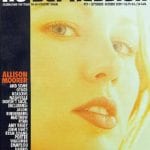John Hiatt – Clear as Muddy
Even if you’ve never seen him do the GQ as the suit-and-tied host of PBS’ “Sessions At West 54th”, you may find it difficult to picture John Hiatt a-sittin’ and a-rockin’ on his back porch playing his perfectly good acoustic guitar. Yes, he and his wife live in an old farmhouse outside of Nashville with a mess of dogs, horses and cats, surrounded by enough acreage to make the city seem a lot further than 30 miles. And yes, his songs have been given a down-home spin by a wide assortment of country artists, including Conway Twitty, Ronnie Milsap and Asleep At The Wheel.
But from his early days sneering through hard-edged rockers such as “Slug Line” and “String Pull Job” to his more recent triumphs as a converter and inverter of roots styles, Hiatt has radiated a roustabout spirit more suited to a roadhouse setting, soul revue or South Side blues bar. And no amount of wholesome picking can nurture the twisted romanticism and biting wit found in Hiatt songs such as “She Loves The Jerk” or lines like “I ain’t no porcupine, take off your kid gloves” (from “Thing Called Love”).
It was in Nashville, though, that this son of Indianapolis began his career as a teenager writing songs and playing in a band called White Duck. And since returning to the South in 1985, following a hellish stint in Los Angeles during which he nearly did himself in with alcohol and drugs and was rocked by his first wife’s suicide, he has cottoned to a down-home existence in reordering his life and getting his dependably undependable career on track.
Now, after his split from Capitol, his fifth major label (following Epic, MCA, Geffen and A&M), Hiatt is returning home in a stylistic sense with his mostly acoustic new album, Crossing Muddy Waters, a one-shot for Vanguard Records, which is releasing it in retail outlets, and EMusic.com, which is selling it on a computer screen near you in the MP3 format. “I see this record as one of the clearer examples of what initially got me going in music,” he said. “It has a little of what Mississippi John Hurt meant to me, a little Dylan, a little Howlin’ Wolf, some of that jug-band thing.”
Most of the songs did, indeed, emerge from regular back-porch sessions — from “sitting there making music, fingerpicking in waltz time, with nothing to rehearse and no more than three chords to play around with,” he says. The album grew out of a series of demos he made last spring with mandolinist/guitarist David Immergluck before having a cyst on his right vocal cord removed (the surgery restored his range and stamina, which had been impaired for three years).
Teamed on the finished recording with Immergluck and bassist Davey Faragher, who play in one of his gallery of terrific backing bands, the Nashville Queens, Hiatt sounds more relaxed and in his element than he has in years — partly because, he says, he didn’t have to follow any “great masterminded plans or deal with a record A&R guy saying we need three tracks for radio.”
In its relaxed emotion and crisp, unencumbered sound, Crossing Muddy Waters resonates with parts of Slow Turning (1988) and Walk On (1995), the first Hiatt album to be transformed by Immergluck’s elegant, ringing mandolin chords. But in its airy distillation of sadness and its firm resolve, it is like nothing Hiatt has done before. Those seeking what he calls the “smartass singer-songwriter” in him will listen in vain. Relationships sunder, loved ones pass, positive feelings fade, and not a smirk emerges. “I had a couple of those songs — you know, the kind where the whole point seems to be that I know something and you don’t,” he says. “But they wouldn’t fit. There was no room for the wiseass.”
Back in his “out of control” days, Hiatt apotheosized pain with the lacerating melodrama of “My Edge Of The Razor”. Later, remarried and in the security blanket of his new family, he opened himself up to the pain of being left behind on “Alone In The Dark”. Lost in “extreme self-pity and frozen fear,” he sang, “I rub my nose in it babe/’Til the roses smell just like death.”
Now, on the title track of Crossing Muddy Waters, written five years ago, he maintains a heartbreaking detachment in describing the emotional fallout of his first wife’s suicide. “Like a rusty shot in a hollow sky, she left me without warning/Sooner than the dogs could bark, faster than the sun broke,” he sings, exuding the clear-eyed strength of finally having come to terms with the tragedy. Transcending the bitter feelings that marked his failed marriage, he extends the most profound sympathy to his late spouse, envisioning her “crying for her baby child, crying for her husband” as she journeyed toward the next world — a journey poetically captured by the title image. “I love old Appalachian laments, where the music is almost happy and the lyrics rip your living soul out,” he says.
Now 48, Hiatt has come a long way from the young artist with whom producers played generic roulette, here dropping him into the slot of sensitive singer-songwriter, there giving him a spin as a stateside Elvis Costello. Having steadily grown as a singer, he approaches roots styles with a blend of grit and twang that is very much his own. He embodies the close ties between country and soul. Where some white blues devotees imitate Howlin’ Wolf to cartoonish effect, Hiatt uses his guttural yowl to cast a spooky elegiac shadow on songs such as “Mr. Stanley”, written shortly after the death of his father-in-law.




